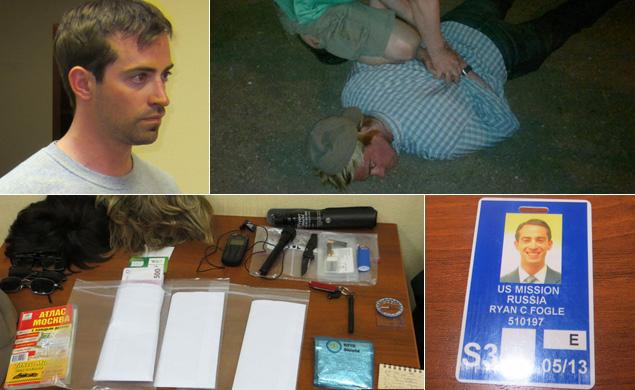
Russia has announced it will expel US diplomat Ryan Fogle briefly detained in Moscow for allegedly trying to recruit a Russian intelligence officer as a spy.
Ryan Fogle, named as CIA agent, was held overnight after he was apparently arrested wearing blond wig.
He has been declared “persona non grata” for “provocative actions in the spirit of the Cold War”, the Russian foreign ministry said on its website.
The US ambassador to Moscow, Michael McFaul, had been summoned, it added.
Ryan Fogle is said to have worked as third political secretary at the US embassy in Moscow.
A state department spokesperson said: “We can confirm that an officer at our US embassy in Moscow was briefly detained and was released. We have seen the Russian foreign ministry announcement and have no further comment at this time.”
The diplomat was reportedly arrested with a large sum of money, technical devices and written instructions for the Russian agent he had tried to recruit.
Photos purporting to show Ryan Fogle’s detention have been widely circulated in the Russian media.
The foreign ministry said it had ordered Ryan Fogle to leave the country, in a statement posted online on Tuesday afternoon.
“Such provocative actions in the spirit of the Cold War will by no means promote the strengthening of mutual trust,” the ministry said.

The incident creates an uncomfortable atmosphere at a time when the US and Russia are involved in delicate diplomacy over Syria and in taking cautious steps towards defrosting relations.
However, the incident is unlikely to have any long-term political consequences, as both countries know that espionage did not end with the Cold War.
Russia’s Federal Security Service earlier released images allegedly showing Ryan Fogle during and after his arrest.
Wearing a blue checked shirt and a plain baseball cap, he was shown being held on the ground with his hands bound, then being escorted away.
Another photo showed him sitting at desk, his hat removed.
Possessions said to be Ryan Fogle’s are laid out on a table. They include a sum of money in 500-euro banknotes and two wigs, one of which he was apparently wearing at the time of his detention.
Also on the table are a compass, map, knife, dark glasses and small mobile phone.
“FSB counter-intelligence agents detained a CIA staff member who had been working under the cover of third political secretary of the US embassy in Moscow,” the FSB said.
“At the moment of detention, special technical equipment was discovered, written instructions for the Russian citizen being recruited, as well as a large sum of money and means for altering appearance.”
Russian state TV has displayed a piece of paper, which it said was Ryan Fogle’s letter to the Russian officer.
Addressing the recipient as “Dear friend”, the letter offers $100,000 “to discuss your experience, expertise and co-operation”.
It goes on to say: “We can offer up to $1 million a year for long-term co-operation, with extra bonuses if we receive some helpful information.
“This is a down payment from someone who is very impressed with your professionalism and who would greatly appreciate your co-operation in the future.”
The letter is simply signed “Your friends”.
The last major espionage case involving the two countries took place in 2010, when 10 people pleaded guilty to spying on the US for Russia.
The alleged agents were deported from the US in exchange for four people the Russians claimed had been spying for the West, in the biggest spy swap since the Cold War.
Last year, a former UK government official admitted that Britain had been caught spying after Russia exposed its use of a fake rock in Moscow to hide electronic equipment.
Shortly after the 2006 incident, Russia introduced tough new legislation on foreign non-governmental organizations (NGOs).
President Vladimir Putin has repeatedly accused Britain, the US and other countries of financing NGOs to meddle in Russian politics.
Last July, Vladimir Putin passed a controversial law requiring all NGOs that receive overseas funding to register as “foreign agents”.
Two months ago, Russian security services launched a series of investigations into foreign-funded NGOs, raiding their offices and seizing computers and documents.
The apparent crackdown drew widespread international criticism.
[youtube CX1TyoG7zwA]